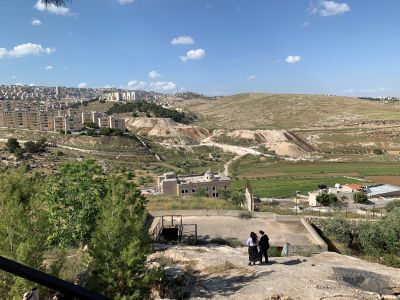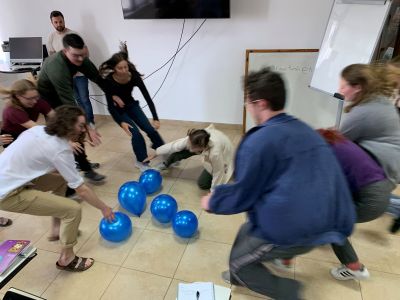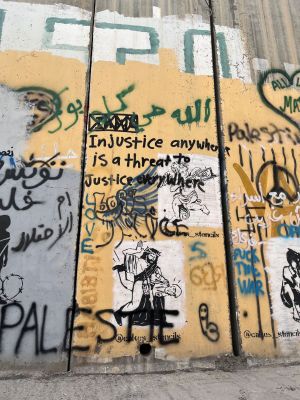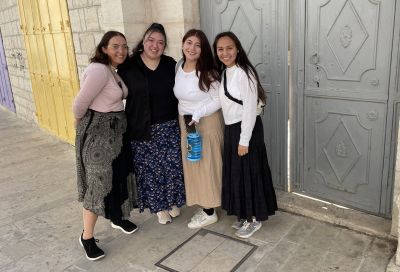“Reconciliation”
Naomi Torres
Being back in the U.S., I still have trouble processing everything I witnessed on our SST. I do not say this discontentedly, but with awe and bewilderment. It was a blessing to see all the religious sites and also consuming to see the visible oppression of political occupation.
On May 13, we were able to talk to Daniel who directs Musalaha, a faith-based organization that works for Israeli-Palestinian “reconciliation” (the word is a direct translation of “musalaha”). Daniel opened our discussion by mentioning the many different social intersections faced by Palestinians. He identifies as a Palestinian Christian, but also as an Israeli citizen and therefore part of a minority in the population. His opening stories reflected multiple dichotomies involved with these intersections, such as when he described how his brother was once tied to a tree by other schoolchildren to resemble Jesus tied to the cross, and mocked by the other children for being Christian.
Now, the idea of being persecuted for being a Christian in the U.S. seems to be very differently represented. American Christians are a majority of the religious makeup in the U.S. and many politicians publicly claim their Christianity. However, most Palestinian Christians, like Palestinians of other faiths, are confined by literal walls. They need to go through a heavy processing procedure to get a permit allowing them to cross to other cities. Hearing the story of school children bullying a Christian “outsider” was difficult to compare to what any Christian Americans live through, and difficult to understand within the context of political oppression as well. Although I might not consider myself a Christian, I grew up in a church and I was taught that Christians were persecuted, but in the context of the U.S. I never really saw it. Then I came to Palestine, a place where the U.S. helps to finance the construction of the Wall of Separation. I started to understand the anger and mistrust of many different people and authorities, and why some groups of people would never want to reach out to understand others’ perspectives.
Musalaha is an organization that seeks to create ties of understanding between Israelis and Palestinians, both of which are parties that have strong identity narratives, and both of which have experienced so much pain and historical oppression. Daniel told us about reconciliation trainings held in desert spaces, the only spaces that could be neutral but also theologically meaningful. Israelis and Palestinians live together in the desert away from the infrastructure of separation, and Musalaha leads them in workshops, active listening, and conflict resolution. Daniel also showed us an example: we blew up balloons, and he separated some of us into two groups. He talked to each of the two groups separately, whispering what seemed like instructions. He then backed away and both parties started rushing toward the balloons, seemingly wanting to gather as many balloons as possible in a short amount of time. The behavior even started to get aggressive with some students trying to grab and push balloons from other’s hands. Daniel stopped the activity and allowed us to reflect on what had happened.
First, Daniel admitted giving different directions to both sides, where one group had one minute to collect balloons while the other had two minutes. So, both groups could have fulfilled the instructions by taking the balloons to one side and then to the other within two minutes. However, as Daniel pointed out, neither group tried talking to each other before grabbing the balloons. He commented that humans are taught to compete, and that we even create competition when there is no need or purpose for it. He explained that the same dynamics are seen in the Israeli-Palestinian reconciliation programs, as well as different views of what reconciliation means: for example, some Israelis in Musalaha’s workshops tend to want to build friendships but without talking about Palestinians’ political interests, while some Palestinians tend to aim for discussion about what political liberation would entail, but without needing or wanting to build friendships as part of that. Trying to reconcile and collaborate instead of competing is therefore very difficult.
I was moved by Musalaha’s work. A considerable number of people in Israel/Palestine are willing to reconcile once they have the opportunity to meet each other, which changed my perspective of how to view the situation of oppression and the Palestinian people. Before the trip, I had been viewing them as victims, and through this lens of victimization my thoughts about the occupation were one-dimensional. However, hearing from Musalaha made me realize how problematic that view was, and how I might instead think critically about the intersections of identity for people, and about the damage of government-supported separation. Daniel mentioned that changing someone’s mind can come through sharing information, but it also might entail showing the same information through many different lenses. I feel like during our trip, I was able to have my mind changed.








